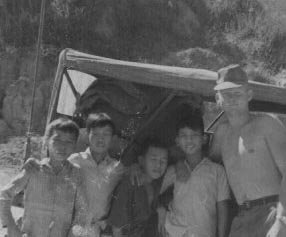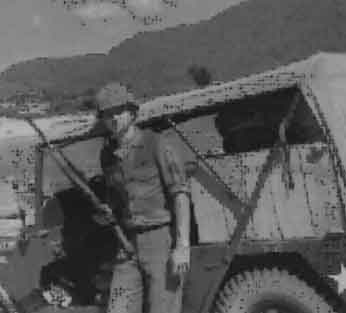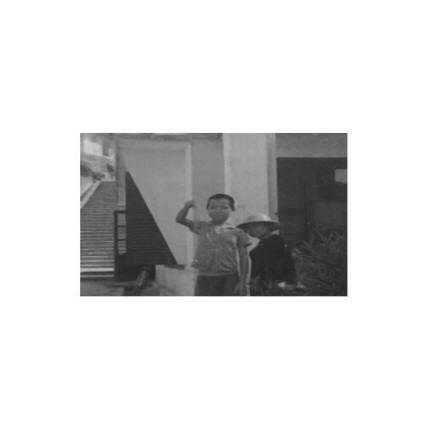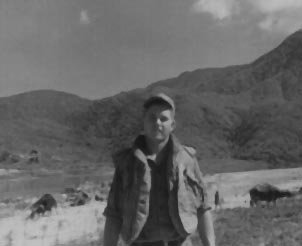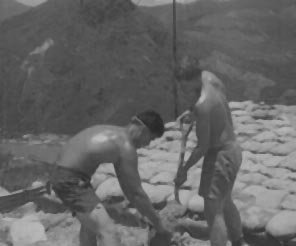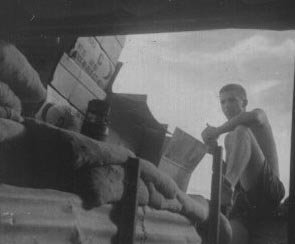 |
|
|
Old G.I.s and Sleeping Dragons
By Doug Francescon
Click here if you'd like to exchange critiques
Copyright Doug Francescon 2004
In Honor of:
Waylen Powell
Joe McCurry
Arnold Palmer
And all the guys who left a piece of themselves in Vietnam
Chapter 5
The Guys
In the units that I was with I saw a cross section of the entire country. We represented everyone from schoolteachers to gang bangers. We came from the north, east, south, and west, with backgrounds as different as night and day. But, the things we had in common far outweighed our differences. None of us wanted to be in Vietnam. None of us gave a damn about the local politics, or who was in control of a place half way round the world. We all missed cold beer, family, old friends, and women who could actually carry on a conversation ("Hay GI, suckie, fuckie, mighty fine boom boom" didn’t count).
Even the meatheads and the ass holes became my brothers. We tolerated one another, cared for one another, shared our loneliness, and kept one another going.
My best buddy was a Texan named Waylen Powell, the most unmilitary soldier who ever lived. He had a rare gift for getting next to people, some he made laugh, some he made furious; but no one ever ignored him. He made me laugh when there was absolutely nothing to laugh about. He forced me to justify things that I had taken for granted all of my life. I'm a better man for having been his friend. He was killed on July 4th, 1967.
Waylen was average height, weight, and build with no outstanding physical characteristics except his smile. It was always there; and it said that he knew something that no one else knew, like he was keeping a secret that was his alone.
He seldom talked about home, but neither did I. That part of our lives was too precious, and too far away from the shit hole where we found ourselves in 1967. We stayed in the present, and kept the conversations focused on whatever bullshit that made us laugh.
We were on a smoke break, in one of those bullshit sessions when a satchel charge came flying through the air and landed in the trench where we were standing. Just before it exploded I hollered “Incoming”, and dove toward to road. The explosion threw me across the road and into the brush. When I came to my senses the entire top of the hill was alive with small arms and automatic weapons fire in all directions.
I found my best buddies body the next morning. Even though there was nothing I could have done to save him, I’ll always feel that I left my best friend behind.
Waylen and I were assigned to different units when we got to Vietnam, and hadn't seen one another for a couple of months. We hooked up at our base camp in DaNang for a three day, in-country, R&R (Rest and Recuperation), and immediately headed for China Beach where we mixed a little body surfing with lots of beer. I remember the surfing because it tended to sober me up. Everything else about the three days was a little hazy.
I was born and raised in Illinois; and the closest I'd come to surfing was listening to the Beach Boys. I worked my butt off trying to out surf Waylen; and if I had been sober I'd have probably killed myself. I was amazed at how quickly he picked it up. But, he was an amazing guy. By the end of the day there were dozens of guys in the water competing with one another for style and distance, and he organized the whole thing just for laughs.
I later figured out that our rotation back to base camp at the same time was arranged to make it easier to transfer Waylen into my section. He had raised so much hell in his own section that they decided to assign him to me.
He was a lousy soldier. He questioned every order he was given, made up his own mind about everything, and if it didn't make sense, he wouldn’t do it. He was no easier on me than any other NCO (sergeant) that he had been assigned to. The first night back in the field he asked why in the hell were we going to be up all night when the rest of the ass holes in the platoon were going to get at least a few hours sleep? I said that: first, we were in charge of night perimeter defense, second, if we're going to be hit it would be at night, third, when it happens I'd rather be awake, and fourth, if someone was going to be responsible for my fucking throat being cut or my head being blown off, I’d prefer it was me.
That was the last time he questioned why we were awake while the other guys were sleeping. You see, Waylen was a lousy soldier, but a very good man. What I said made sense, and he accepted it because it did. He didn’t do things because the army said so, or because I said so. He governed his actions by what his heart told him was correct. He was honest with himself, and with others. He accepted responsibility when it was his to accept.
The things I learned because of my friendship with Waylen Powell have stayed with me all these years. He didn’t give his respect to anyone. It had to be earned with honesty and courage. I wish that more people could have known him the way I did. It’s been over thirty years, and I still miss him.
Joe McCurry was a little bit of every guy I’d ever met. He was burgers and fries, and cold beer after the game. Having him around was like being close to a piece of home.
He was slender, built like a shortstop (a baseball player who is very quick and agile). He kept his hair cut very short when long hair was the style. He seemed to fit in no mater who he was with.
He was transferred to me when two of my guys were re-assigned to another section. The army shuffled people from time to time, trying to improve units that had problems.
Joe didn’t complain about being in the field. In fact, he liked the change from the “regular army” style of life that existed in base camp. He never considered the extra risks that came from being in the bush. Very few guys did until they were hit or were close to someone who was. The first time Joe saw serious action was the night he was killed.
He and Arnold Palmer were assigned to man our only search light on the night we were overrun. They were scheduled for sunset to midnight. Powell and I planned to take midnight to sunup. We normally had two lights and a thirty-caliber machine gun manned all night long. So, there was never a time when we weren’t watching the perimeter. But, on July 4th one of the lights was out of action, something that seldom happened.
The machine gun was always set up at the landing zone position because there were fewer Marines there. We wanted our gun to beef up firepower at our weakest point.
We varied the intervals of the illumination missions (the times that the lights were on). We also mixed white light with infrared (light that we could see through special binoculars, but no one else could).
Joe and Arnold ran their last mission between 11:30 and 11:45. They went to their bunker after the mission, but before Powell and I relieved them. That was a big mistake because it was the exact time that we were hit. I didn’t tell them to wait for us, but I shouldn’t have to. They knew better. They were both very good men who simply made a mistake.
Powell and I were in the trench line within fifty feet of the light and bunker. I’m sure Joe and Arnold saw us there and thought we had them covered. The Vietnamese who threw the satchel charge at us had to walk past the searchlight. The mistake and some incredible luck allowed him to walk right up on us.
The edge of the landing zone where the light was located was at the top of a steep ridge. It was less than one hundred feet to the edge of the jungle that dropped away from our position. Even if both lights had been manned that night we still would have been overrun. The only thing that could have made a difference was a wide kill zone that the Vietnamese would have had to cross in order to get to us. It would have allowed us to use our firepower. We were so badly outnumbered, and they were on us so fast that Joe and Arnold never had a chance.
Arnold Palmer was with us from the time we left the states. He was one of the most single-minded guys I’ve ever met. All he talked about was home. All he was interested in was back home. All he cared about was back home. He never talked about baseball, football, basketball, or women. He didn’t even bitch about the army, the rain, or the 25-year-old c-rations that we lived on for months at a time. And, in the army, bitching is like therapy.
He just wanted to go home. Everything he hoped for, dreamed about, or wanted for the rest of his life was right there. He found paradise; and was just trying to live long enough to get back to it. It’s a tragedy that he never spent another day in the paradise he found.
The two guys who were transferred out of my section, Ertus Ford and Pete Terronus, were as good as they came. Both were confident, dependable, and hard working. They made running the section easy; and, at the same time, taught me lessons that have served me well for over 30 years. The most important of these was trust, when to give it and how to gain it.
My section was one of the best in the unit, and it was because I had the best guys. I guess the Army decided that I should share the wealth.
There was no way for a section leader, platoon sergeant, or anyone responsible for the actions of others to be everywhere and see everything. Therefore, there was no choice but to trust my men. The key was to be as hard working as my hardest working subordinate, to be as interested in them as I hoped they were in me, to care enough about them that they knew they could depend on me. It was essential to be on top of our situation. Each detail was important because if it effected my people, it also effected me.
It was not necessary to be the strongest, smartest, or toughest, but, it was essential to jump in and give it my best shot. Pete Terronus was a very tough, hard-nosed Latino who was used to hard work. There was no way that I could fill sandbags as fast or stack them as precisely as Pete, but it was essential to be next to him, sweating the entire time that he did.
Ertus Ford was a schoolteacher. He was not only intelligent, and well educated, but he could think on his feet, and was extremely street smart. I didn’t even have to let Ford know what was needed. By the time I told him he had already taken care of it. I simply needed to communicate with him regularly so that everyone was on the same page. I needed to know what the company commanders, platoon leaders, and battery commanders were planning, and make sure that we were in the right place at the right time so that we didn’t have to do things twice. My guys took care of the rest.
The pit fall in the situation that I just described was to become complacent and lazy, to assume that things would be taken care of because my people were capable. That was where honesty and hard work came in. A good leader had be involved enough to know what was going on without getting in the way of those doing the work.
My guys taught me that the key element was honesty. Without it, good working relationships were impossible. Actions that could have been considered manipulative and userous were very appropriate as long as the motives that cause them were not self-serving. A leader that did not manipulate conditions within his sphere of influence would find it hard to be effective. However, he had to keep his own interests in the correct perspective.
In the beginning my relationship with Ford was difficult. I was transferred into the battery where he had been serving just before we shipped out. He was in line to take over his section, and should have because of his unusually high qualifications. But, because the army was the army and because I had time in grade, the section leader job was given to me. He didn’t go out of his way to make things tough, but he certainly didn’t cut me any slack. He expected me to do the job that I had been given from the moment I took over. He forced me to be sharp at all times; and, in a combat zone, that was a good way to do business. To this day, I’m at my best when the pressure is on.
Without a doubt the most colorful guy in the unit was sp5 Witkus. I never knew his first name, and never heard him called anything but Witkus. He had the body of an NFL linebacker, and the face of a Mafia enforcer. He was a career soldier whose ability to get into and out of trouble was only overshadowed by his ability to get things done.
I got a call from him on the radio one day asking what I wanted him to do with the truckload of cold beer. At the time we were on a hilltop, miles from anywhere. Because I thought he was kidding I told him to bring it up so that I could sit in it for a while. Within an hour he rounded the switchback that led to our L.Z. driving a ¾ ton truck full of ice and beer. In all of my beer drinking days I never had a better tasting brew.
After my position was overrun I was sent back to base camp in DaNang to get patched up and re-supplied. One afternoon Witkus asked if I wanted to go into town. I jumped at the chance to break up the routine of base camp. One of our stops included taking the child that I talked about earlier to an aid station for treatment of a head wound. After his errands were finished we stopped for a beer. After the beer we stopped for a couple of drinks. Because one good drink deserves another, we stopped for a few more.
Sometime long after dark we stumbled out of a local shit hole, and headed for the truck that was actually classified as stolen because he didn’t get authorization to take it before we left. He stopped in the middle of the lot where the truck was parked, turned and looked at me with those Mafia enforcer eyes, and asked if I thought I could kick his ass before he kicked mine. I thought about it for a second, and said that it really made no difference because by the time it was over I’d make his face look like ground beef. So, no one would be sure of the outcome anyway. He thought about it for a second, and began to laugh. It started in his toes and went all the way up his body. It was one of those infectious laughs that you just can’t ignore. The longer it went on the funnier that it was. As drunk as we were, neither of us would have felt the effects of the fight until the next day.
We got back to base camp sometime before dawn. The C.Q. (Charge of Quarters) was waiting for us and woke First Sergeant Brown. He began screaming before he was close enough for me to actually see his face. I was in that half way zone between drunk and hung over. I remember that I couldn’t understand much of what he was saying, but the overall meaning was crystal clear. I was an army sergeant acting like a dumb kid, willing to get my head blown off or my throat cut for a few drinks. The word fool kept hitting me like a slap in the face, and he used it over and over again.
I’d been chewed out before, but never better than by Sergeant Brown. He knew how to make the words stick; and the “crusty old bastard” drove the point home. It was the last time I took a drink while I was in country.
My second best ass chewing came at the hands of a Gunnery Sergeant at the firebase at An Hoa. He called me in to tell me that I would no longer be allowed to use our jeeps to make our regular chow runs (going to get something to eat). He thought it was bad for moral because not everyone got to ride.
I explained to him that we gave rides to as many guys as we could fit on the jeeps; and it was better to run the vehicles up and down the road, rather than letting them sit in the same positions for long periods of time. I was being honest about the whole thing. I really felt that it was better to use them whenever we could.
He cut me off, and said that he’d made up his mind, and that was that. I cut him off, and said that those were U.S. Army jeeps, not Marine Corps. I then reminded him that they were my responsibility and, as such, I’d decide how they were used. I finished up by saying that I really couldn’t help it if he had a fucking morale problem.
I’ll never forget the look on his face. Obviously, no other E-5 sergeant had ever talked to him that way. His face turned a color that I’d never seen before. The veins in his neck not only began to bulge, but I could actually see them throb. I missed part of what he said because those throbbing veins fascinated me. The one thing that struck home was the fact that he was going to call First Sergeant Brown about the problem. I really didn’t want another session with the champion of the ass chewers.
Never the less, I held my ground, and continued to use the jeeps. Apparently, Sergeant Brown agreed with me because I never heard any more about jeeps.
WAYLEN AND THE KIDS AT THE RIVER
This is the way I’ll remember him. He had a way of touching everyone he met. He was a very special man.
WAITING TO CROSS THE RIVER
ON THE WAY TO NONG SON
It was a one way trip for most of us.
HE’S HOLDING A LIZARD. IT WAS HIS PRIDE AND JOY.
ON CONVOY IN THE MOUNTAINS
There were two kinds of roads, muddy and dusty. The same road could be either depending on the weather.
PETE AND ME FILLING SAND BAGSIf we weren’t digging we were filling.
JOE TAKING A BREAK OUTSIDE THE BUNKERHe’s sitting on the spot where Pete killed the Bamboo Viper (a very deadly snake). It was living in the bunker when we moved in.
FORD WITH HIS OWN SECTION AT THE BRIDGENo man ever deserved a promotion more.
